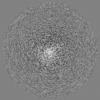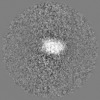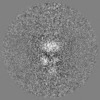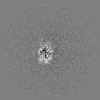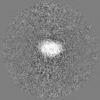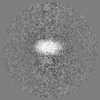[English] 日本語
 Yorodumi
Yorodumi- EMDB-9648: Cryo-EM structure of gamma secretase in complex with a Notch fragment -
+ Open data
Open data
- Basic information
Basic information
| Entry | Database: EMDB / ID: EMD-9648 | |||||||||
|---|---|---|---|---|---|---|---|---|---|---|
| Title | Cryo-EM structure of gamma secretase in complex with a Notch fragment | |||||||||
 Map data Map data | ||||||||||
 Sample Sample |
| |||||||||
 Keywords Keywords | complex / MEMBRANE PROTEIN | |||||||||
| Function / homology |  Function and homology information Function and homology informationDefective LFNG causes SCDO3 / coronary sinus valve morphogenesis / cardiac right atrium morphogenesis / cardiac right ventricle formation / growth involved in heart morphogenesis / Notch signaling pathway involved in regulation of secondary heart field cardioblast proliferation / cell differentiation in spinal cord / venous endothelial cell differentiation / retinal cone cell differentiation / arterial endothelial cell differentiation ...Defective LFNG causes SCDO3 / coronary sinus valve morphogenesis / cardiac right atrium morphogenesis / cardiac right ventricle formation / growth involved in heart morphogenesis / Notch signaling pathway involved in regulation of secondary heart field cardioblast proliferation / cell differentiation in spinal cord / venous endothelial cell differentiation / retinal cone cell differentiation / arterial endothelial cell differentiation / Constitutive Signaling by NOTCH1 t(7;9)(NOTCH1:M1580_K2555) Translocation Mutant / epithelial cell fate commitment / negative regulation of pro-B cell differentiation / Pre-NOTCH Processing in the Endoplasmic Reticulum / negative regulation of inner ear auditory receptor cell differentiation / mitral valve formation / cell migration involved in endocardial cushion formation / negative regulation of photoreceptor cell differentiation / : / regulation of somitogenesis / endocardium morphogenesis / foregut morphogenesis / distal tubule development / inhibition of neuroepithelial cell differentiation / MAML1-RBP-Jkappa- ICN1 complex / regulation of epithelial cell proliferation involved in prostate gland development / cardiac chamber formation / auditory receptor cell fate commitment / negative regulation of endothelial cell chemotaxis / atrioventricular node development / positive regulation of transcription of Notch receptor target / positive regulation of aorta morphogenesis / neuroendocrine cell differentiation / cellular response to tumor cell / negative regulation of extracellular matrix constituent secretion / Cajal-Retzius cell differentiation / collecting duct development / positive regulation of L-glutamate import across plasma membrane / compartment pattern specification / amyloid precursor protein biosynthetic process / positive regulation of endopeptidase activity / positive regulation of apoptotic process involved in morphogenesis / Notch receptor processing / vasculogenesis involved in coronary vascular morphogenesis / gamma-secretase complex / regulation of extracellular matrix assembly / short-term synaptic potentiation / endocardial cell differentiation / chemical synaptic transmission, postsynaptic / epithelial to mesenchymal transition involved in endocardial cushion formation / aspartic endopeptidase activity, intramembrane cleaving / positive regulation of amyloid precursor protein biosynthetic process / T-helper 17 type immune response / cardiac ventricle morphogenesis / smooth endoplasmic reticulum calcium ion homeostasis / Noncanonical activation of NOTCH3 / protein catabolic process at postsynapse / epidermal cell fate specification / positive regulation of smooth muscle cell differentiation / mesenchymal cell development / coronary vein morphogenesis / cardiac left ventricle morphogenesis / cardiac vascular smooth muscle cell development / TGFBR3 PTM regulation / negative regulation of myotube differentiation / left/right axis specification / : / synaptic vesicle targeting / negative regulation of catalytic activity / positive regulation of coagulation / central nervous system myelination / negative regulation of axonogenesis / glomerular mesangial cell development / somatic stem cell division / negative regulation of cell adhesion molecule production / apoptotic process involved in embryonic digit morphogenesis / endocardium development / membrane protein intracellular domain proteolysis / negative regulation of cardiac muscle hypertrophy / regulation of cell adhesion involved in heart morphogenesis / positive regulation of cardiac epithelial to mesenchymal transition / positive regulation of endothelial cell differentiation / cardiac epithelial to mesenchymal transition / interleukin-17-mediated signaling pathway / pericardium morphogenesis / cardiac atrium morphogenesis / skin morphogenesis / Pre-NOTCH Processing in Golgi / choline transport / secretory columnal luminar epithelial cell differentiation involved in prostate glandular acinus development / T cell activation involved in immune response / cardiac muscle cell myoblast differentiation / negative regulation of collagen biosynthetic process / cellular response to follicle-stimulating hormone stimulus / neuronal stem cell population maintenance / NOTCH4 Activation and Transmission of Signal to the Nucleus / ciliary rootlet / negative regulation of calcium ion-dependent exocytosis / Regulated proteolysis of p75NTR / positive regulation of astrocyte differentiation Similarity search - Function | |||||||||
| Biological species |  Homo sapiens (human) Homo sapiens (human) | |||||||||
| Method | single particle reconstruction / cryo EM / Resolution: 2.7 Å | |||||||||
 Authors Authors | Yang G / Zhou R | |||||||||
| Funding support |  China, 1 items China, 1 items
| |||||||||
 Citation Citation |  Journal: Nature / Year: 2019 Journal: Nature / Year: 2019Title: Structural basis of Notch recognition by human γ-secretase. Authors: Guanghui Yang / Rui Zhou / Qiang Zhou / Xuefei Guo / Chuangye Yan / Meng Ke / Jianlin Lei / Yigong Shi /  Abstract: Aberrant cleavage of Notch by γ-secretase leads to several types of cancer, but how γ-secretase recognizes its substrate remains unknown. Here we report the cryo-electron microscopy structure of ...Aberrant cleavage of Notch by γ-secretase leads to several types of cancer, but how γ-secretase recognizes its substrate remains unknown. Here we report the cryo-electron microscopy structure of human γ-secretase in complex with a Notch fragment at a resolution of 2.7 Å. The transmembrane helix of Notch is surrounded by three transmembrane domains of PS1, and the carboxyl-terminal β-strand of the Notch fragment forms a β-sheet with two substrate-induced β-strands of PS1 on the intracellular side. Formation of the hybrid β-sheet is essential for substrate cleavage, which occurs at the carboxyl-terminal end of the Notch transmembrane helix. PS1 undergoes pronounced conformational rearrangement upon substrate binding. These features reveal the structural basis of Notch recognition and have implications for the recruitment of the amyloid precursor protein by γ-secretase. | |||||||||
| History |
|
- Structure visualization
Structure visualization
| Movie |
 Movie viewer Movie viewer |
|---|---|
| Structure viewer | EM map:  SurfView SurfView Molmil Molmil Jmol/JSmol Jmol/JSmol |
| Supplemental images |
- Downloads & links
Downloads & links
-EMDB archive
| Map data |  emd_9648.map.gz emd_9648.map.gz | 117.1 MB |  EMDB map data format EMDB map data format | |
|---|---|---|---|---|
| Header (meta data) |  emd-9648-v30.xml emd-9648-v30.xml emd-9648.xml emd-9648.xml | 28.8 KB 28.8 KB | Display Display |  EMDB header EMDB header |
| Images |  emd_9648.png emd_9648.png | 69.8 KB | ||
| Filedesc metadata |  emd-9648.cif.gz emd-9648.cif.gz | 8 KB | ||
| Others |  emd_9648_additional.map.gz emd_9648_additional.map.gz | 111.8 MB | ||
| Archive directory |  http://ftp.pdbj.org/pub/emdb/structures/EMD-9648 http://ftp.pdbj.org/pub/emdb/structures/EMD-9648 ftp://ftp.pdbj.org/pub/emdb/structures/EMD-9648 ftp://ftp.pdbj.org/pub/emdb/structures/EMD-9648 | HTTPS FTP |
-Related structure data
| Related structure data |  6idfMC M: atomic model generated by this map C: citing same article ( |
|---|---|
| Similar structure data |
- Links
Links
| EMDB pages |  EMDB (EBI/PDBe) / EMDB (EBI/PDBe) /  EMDataResource EMDataResource |
|---|---|
| Related items in Molecule of the Month |
- Map
Map
| File |  Download / File: emd_9648.map.gz / Format: CCP4 / Size: 125 MB / Type: IMAGE STORED AS FLOATING POINT NUMBER (4 BYTES) Download / File: emd_9648.map.gz / Format: CCP4 / Size: 125 MB / Type: IMAGE STORED AS FLOATING POINT NUMBER (4 BYTES) | ||||||||||||||||||||||||||||||||||||||||||||||||||||||||||||
|---|---|---|---|---|---|---|---|---|---|---|---|---|---|---|---|---|---|---|---|---|---|---|---|---|---|---|---|---|---|---|---|---|---|---|---|---|---|---|---|---|---|---|---|---|---|---|---|---|---|---|---|---|---|---|---|---|---|---|---|---|---|
| Projections & slices | Image control
Images are generated by Spider. | ||||||||||||||||||||||||||||||||||||||||||||||||||||||||||||
| Voxel size | X=Y=Z: 1.091 Å | ||||||||||||||||||||||||||||||||||||||||||||||||||||||||||||
| Density |
| ||||||||||||||||||||||||||||||||||||||||||||||||||||||||||||
| Symmetry | Space group: 1 | ||||||||||||||||||||||||||||||||||||||||||||||||||||||||||||
| Details | EMDB XML:
CCP4 map header:
| ||||||||||||||||||||||||||||||||||||||||||||||||||||||||||||
-Supplemental data
-Additional map: #1
| File | emd_9648_additional.map | ||||||||||||
|---|---|---|---|---|---|---|---|---|---|---|---|---|---|
| Projections & Slices |
| ||||||||||||
| Density Histograms |
- Sample components
Sample components
-Entire : gamma-secretase
| Entire | Name: gamma-secretase |
|---|---|
| Components |
|
-Supramolecule #1: gamma-secretase
| Supramolecule | Name: gamma-secretase / type: complex / ID: 1 / Parent: 0 / Macromolecule list: #1-#5 |
|---|---|
| Source (natural) | Organism:  Homo sapiens (human) Homo sapiens (human) |
-Macromolecule #1: Nicastrin
| Macromolecule | Name: Nicastrin / type: protein_or_peptide / ID: 1 / Number of copies: 1 / Enantiomer: LEVO |
|---|---|
| Source (natural) | Organism:  Homo sapiens (human) Homo sapiens (human) |
| Molecular weight | Theoretical: 78.48357 KDa |
| Recombinant expression | Organism:  Homo sapiens (human) Homo sapiens (human) |
| Sequence | String: MATAGGGSGA DPGSRGLLRL LSFCVLLAGL CRGNSVERKI YIPLNKTAPC VRLLNATHQI GCQSSISGDT GVIHVVEKEE DLQWVLTDG PNPPYMVLLE SKHFTRDLME KLKGRTSRIA GLAVSLTKPS PASGFSPSVQ CPNDGFGVYS NSYGPEFAHC R EIQWNSLG ...String: MATAGGGSGA DPGSRGLLRL LSFCVLLAGL CRGNSVERKI YIPLNKTAPC VRLLNATHQI GCQSSISGDT GVIHVVEKEE DLQWVLTDG PNPPYMVLLE SKHFTRDLME KLKGRTSRIA GLAVSLTKPS PASGFSPSVQ CPNDGFGVYS NSYGPEFAHC R EIQWNSLG NGLAYEDFSF PIFLLEDENE TKVIKQCYQD HNLSQNGSAP TFPLCAMQLF SHMHAVISTA TCMRRSSIQS TF SINPEIV CDPLSDYNVW SMLKPINTTG TLKPDDRVVV AATRLDSRSF FWNVAPGAES AVASFVTQLA AAEALQKAPD VTT LPRNVM FVFFQGETFD YIGSSRMVYD MEKGKFPVQL ENVDSFVELG QVALRTSLEL WMHTDPVSQK NESVRNQVED LLAT LEKSG AGVPAVILRR PNQSQPLPPS SLQRFLRARN ISGVVLADHS GAFHNKYYQS IYDTAENINV SYPEWLSPEE DLNFV TDTA KALADVATVL GRALYELAGG TNFSDTVQAD PQTVTRLLYG FLIKANNSWF QSILRQDLRS YLGDGPLQHY IAVSSP TNT TYVVQYALAN LTGTVVNLTR EQCQDPSKVP SENKDLYEYS WVQGPLHSNE TDRLPRCVRS TARLARALSP AFELSQW SS TEYSTWTESR WKDIRARIFL IASKELELIT LTVGFGILIF SLIVTYCINA KADVLFIAPR EPGAVSY UniProtKB: Nicastrin |
-Macromolecule #2: Presenilin-1
| Macromolecule | Name: Presenilin-1 / type: protein_or_peptide / ID: 2 / Number of copies: 1 / Enantiomer: LEVO EC number: Hydrolases; Acting on peptide bonds (peptidases); Aspartic endopeptidases |
|---|---|
| Source (natural) | Organism:  Homo sapiens (human) Homo sapiens (human) |
| Molecular weight | Theoretical: 52.644543 KDa |
| Recombinant expression | Organism:  Homo sapiens (human) Homo sapiens (human) |
| Sequence | String: MTELPAPLSY FQNAQMSEDN HLSNTVRSQN DNRERQEHND RRSLGHPEPL SNGRPQGNSR QVVEQDEEED EELTLKYGAK HVIMLFVPV TLCMVVVVAT IKSVSFYTRK DGCLIYTPFT EDTETVGQRA LHSILNAAIM ISVIVVMTIL LVVLYKYRCY K VIHAWLII ...String: MTELPAPLSY FQNAQMSEDN HLSNTVRSQN DNRERQEHND RRSLGHPEPL SNGRPQGNSR QVVEQDEEED EELTLKYGAK HVIMLFVPV TLCMVVVVAT IKSVSFYTRK DGCLIYTPFT EDTETVGQRA LHSILNAAIM ISVIVVMTIL LVVLYKYRCY K VIHAWLII SSLLLLFFFS FIYLGEVFKT YNVAVDYITV ALLIWNFGVV GMISIHWKGP LRLQQAYLIM ISALMALVFI KY LPEWTAW LILAVISVYD LVAVLCPKGP LRMLVETAQE RNETLFPALI YSSTMVWLVN MAEGDPEAQR RVSKNSKYNA EST ERESQD TVAENDDGGF SEEWEAQRDS HLGPHRSTPE SRAAVQELSS SILAGEDPEE RGVKLGLGAF IFYSVLVGKA SATA SGDWN TTIACFVAIL IGLCLTLLLL AIFKKALPAL PISITFGLVF YFATDYLVQP FMDQLAFHQF YI UniProtKB: Presenilin-1 |
-Macromolecule #3: Gamma-secretase subunit APH-1A
| Macromolecule | Name: Gamma-secretase subunit APH-1A / type: protein_or_peptide / ID: 3 / Number of copies: 1 / Enantiomer: LEVO |
|---|---|
| Source (natural) | Organism:  Homo sapiens (human) Homo sapiens (human) |
| Molecular weight | Theoretical: 29.017943 KDa |
| Recombinant expression | Organism:  Homo sapiens (human) Homo sapiens (human) |
| Sequence | String: MGAAVFFGCT FVAFGPAFAL FLITVAGDPL RVIILVAGAF FWLVSLLLAS VVWFILVHVT DRSDARLQYG LLIFGAAVSV LLQEVFRFA YYKLLKKADE GLASLSEDGR SPISIRQMAY VSGLSFGIIS GVFSVINILA DALGPGVVGI HGDSPYYFLT S AFLTAAII ...String: MGAAVFFGCT FVAFGPAFAL FLITVAGDPL RVIILVAGAF FWLVSLLLAS VVWFILVHVT DRSDARLQYG LLIFGAAVSV LLQEVFRFA YYKLLKKADE GLASLSEDGR SPISIRQMAY VSGLSFGIIS GVFSVINILA DALGPGVVGI HGDSPYYFLT S AFLTAAII LLHTFWGVVF FDACERRRYW ALGLVVGSHL LTSGLTFLNP WYEASLLPIY AVTVSMGLWA FITAGGSLRS IQ RSLLCRR QEDSRVMVYS ALRIPPED UniProtKB: Gamma-secretase subunit APH-1A |
-Macromolecule #4: Gamma-secretase subunit PEN-2
| Macromolecule | Name: Gamma-secretase subunit PEN-2 / type: protein_or_peptide / ID: 4 / Number of copies: 1 / Enantiomer: LEVO |
|---|---|
| Source (natural) | Organism:  Homo sapiens (human) Homo sapiens (human) |
| Molecular weight | Theoretical: 12.038029 KDa |
| Recombinant expression | Organism:  Homo sapiens (human) Homo sapiens (human) |
| Sequence | String: MNLERVSNEE KLNLCRKYYL GGFAFLPFLW LVNIFWFFRE AFLVPAYTEQ SQIKGYVWRS AVGFLFWVIV LTSWITIFQI YRPRWGALG DYLSFTIPLG TP UniProtKB: Gamma-secretase subunit PEN-2 |
-Macromolecule #5: Notch1
| Macromolecule | Name: Notch1 / type: protein_or_peptide / ID: 5 / Number of copies: 1 / Enantiomer: LEVO |
|---|---|
| Source (natural) | Organism:  Homo sapiens (human) Homo sapiens (human) |
| Molecular weight | Theoretical: 14.7585 KDa |
| Recombinant expression | Organism:  Homo sapiens (human) Homo sapiens (human) |
| Sequence | String: MVQSETVECP PPAQLHFMYV AAAAFVLLFF VGCGVLLSRK RRRQHGQLWF PEGFKVSEAS KKKRREPLGE DSVGLKPLKN ASDGALMDD NQNEWGDEDL ETEQKLISEE DLLESDEVDA IEHHHHHHHH |
-Macromolecule #8: 2-acetamido-2-deoxy-beta-D-glucopyranose
| Macromolecule | Name: 2-acetamido-2-deoxy-beta-D-glucopyranose / type: ligand / ID: 8 / Number of copies: 6 / Formula: NAG |
|---|---|
| Molecular weight | Theoretical: 221.208 Da |
| Chemical component information |  ChemComp-NAG: |
-Macromolecule #9: 1,2-DIACYL-SN-GLYCERO-3-PHOSPHOCHOLINE
| Macromolecule | Name: 1,2-DIACYL-SN-GLYCERO-3-PHOSPHOCHOLINE / type: ligand / ID: 9 / Number of copies: 4 / Formula: PC1 |
|---|---|
| Molecular weight | Theoretical: 790.145 Da |
| Chemical component information | 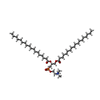 ChemComp-PC1: |
-Macromolecule #10: CHOLESTEROL
| Macromolecule | Name: CHOLESTEROL / type: ligand / ID: 10 / Number of copies: 3 / Formula: CLR |
|---|---|
| Molecular weight | Theoretical: 386.654 Da |
| Chemical component information | 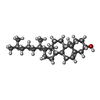 ChemComp-CLR: |
-Experimental details
-Structure determination
| Method | cryo EM |
|---|---|
 Processing Processing | single particle reconstruction |
| Aggregation state | particle |
- Sample preparation
Sample preparation
| Buffer | pH: 7.4 |
|---|---|
| Vitrification | Cryogen name: ETHANE |
- Electron microscopy
Electron microscopy
| Microscope | FEI TITAN KRIOS |
|---|---|
| Image recording | Film or detector model: GATAN K2 SUMMIT (4k x 4k) / Average electron dose: 1.5625 e/Å2 |
| Electron beam | Acceleration voltage: 300 kV / Electron source:  FIELD EMISSION GUN FIELD EMISSION GUN |
| Electron optics | Illumination mode: FLOOD BEAM / Imaging mode: BRIGHT FIELD |
| Experimental equipment |  Model: Titan Krios / Image courtesy: FEI Company |
 Movie
Movie Controller
Controller


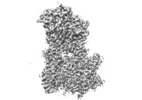







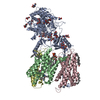

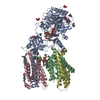


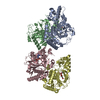

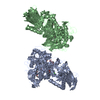









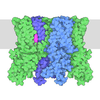




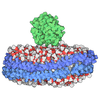

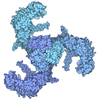

 Z (Sec.)
Z (Sec.) Y (Row.)
Y (Row.) X (Col.)
X (Col.)








